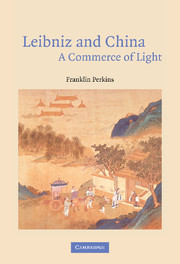4 - Interpreting China
Published online by Cambridge University Press: 16 November 2009
Summary
HERMENEUTICS
Thus far the application of Leibniz's philosophy to his engagement with China has focused on his views about exchange rather than his attempts to carry out a “commerce of light.” In spite of the limitations of his knowledge, Leibniz was engaged with Chinese culture and thought and with issues of interpretation. Even the vision of exchange presented in the last chapter depends on certain interpretations of China. One reason to consider how Leibniz engages China is his relative success as an interpreter. My claim is that Leibniz's philosophy provides a rich foundation not only for promoting cultural exchange but also for understanding how exchange works. Leibniz makes many mistakes, but his interpretations of the complexities of Chinese thought far surpass those of his contemporaries in Europe, and even many of the missionaries in China. This very success prompts us to ask if some basis in Leibniz's philosophy enables him to make the interpretations he does. A second reason for considering Leibniz's hermeneutics is the centrality of interpretation to his own philosophical practice. He presents himself as finding the best in diverse texts and synthesizing them, not only with China but also with the history of philosophy and with various Christian factions. While Leibniz does not reflect explicitly on intercultural hermeneutics, the foundation for understanding and interpreting other cultures has already been established in chapter 2.
- Type
- Chapter
- Information
- Leibniz and ChinaA Commerce of Light, pp. 158 - 198Publisher: Cambridge University PressPrint publication year: 2004



